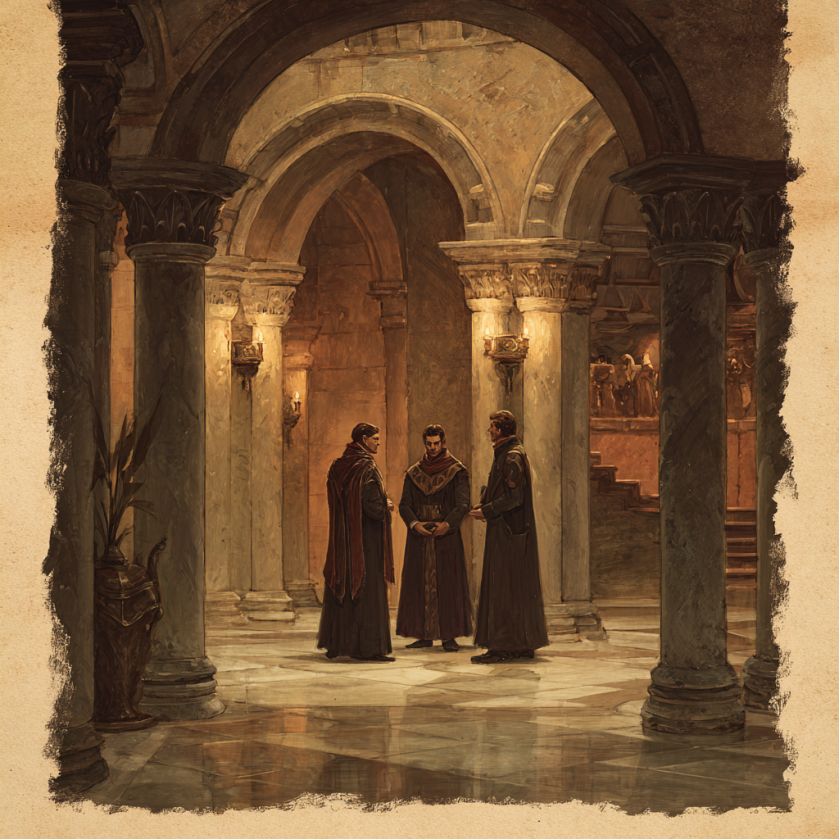The Five Councils
The formal diplomatic structure binding The Crescent's major city-states since the Great Convocation of 0 ANE.
Structure and Process
Council Representatives - The Three Voices
Each city-state sends three representatives to bimonthly council sessions:
Usually affiliated with or approved by the Concord, handles commercial policies and trade disputes. These representatives understand market dynamics and maintain connections with major merchant houses.
Military or security leadership responsible for coordinating mutual defense, shared threats, and protection protocols. Often veteran commanders or current military officials.
The city's primary political authority figure or their designated representative. Makes final decisions on matters affecting city sovereignty and inter-city relations.
Meeting Operations
Sessions rotate between member cities every two months, with the host city setting the primary agenda. Decisions require majority agreement from each type of Voice - Trade, Defense, and Sovereign must each reach consensus for binding resolutions.
Smaller settlements send observers but cannot vote, creating ongoing tension about representation versus influence in council decisions.
Official Powers
The Five Councils System coordinates several critical functions:
Trade Regulation - Standardize tariffs, resolve commercial disputes, establish common trade laws that apply across city boundaries.
Mutual Defense - Coordinate responses to external threats, share intelligence about regional dangers, organize joint military operations when necessary.
Travel Documentation - Issue official papers that provide legal passage between cities, verify traveler credentials at major checkpoints.
Dispute Mediation - Provide neutral ground for resolving conflicts between cities before they escalate to economic or military retaliation.
Infrastructure Maintenance - Oversee Old King's Road upkeep, coordinate with Road Wardens for major repair projects.
The Five Councils Guard
An elite unit drawn from all member cities provides security for proceedings and representatives. Their distinctive armor incorporates symbols from all five cities, marking them as neutral servants of the system rather than any individual city.
Guard service is considered prestigious, requiring extensive training in both diplomacy and security protocols. Veterans often retire into advisory positions or private security roles, bringing their valuable experience with them.
The Five Councils Badge
The official badge features a circular shield divided into five equal pie-shaped sections, each displaying the dominant color of a member city: blue for Cairune, deep red for Bhel Kurzum, white for Illyndra, forest green for Quelenthalar, and midnight purple for Ecleptara.
Encircling the shield, inscribed in flowing Old Common script, runs the motto "Vel'tar neth morvani" - "Bound not by rule" - reflecting how the councils function through practical cooperation rather than authoritarian control. The elegant drow lettering serves as a reminder of the civilization that first united The Crescent, while acknowledging that different methods now maintain that unity.
Badge Details
Colors: Blue (Cairune), deep red (Bhel Kurzum), white (Illyndra), forest green (Quelenthalar), midnight purple (Ecleptara)
Motto: "Vel'tar neth morvani" - "Bound not by rule"
Five Councils Guards wear this badge prominently on their armor, literally embodying the balance of five cities while serving none exclusively. The badge has become a recognized symbol of neutral authority throughout The Crescent, respected even by those who criticize council inefficiency.
Current Political Dynamics
City Positions
Cairune advocates for stronger central authority
Bhel Kurzum prefers loose confederation
Illyndra remains resistant to centralized control
Quelenthalar frequently sends limited delegations or abstains entirely
Ecleptara typically attempts to mediate between competing positions
Practical Challenges
Trade Voices' connections to the Concord create power imbalances, as merchant house interests sometimes override broader city concerns. Cities regularly ignore council decisions when implementation proves inconvenient or costly.
Informal negotiations during breaks and evening social events often carry more weight than formal session votes, leading to backroom deals that bypass official procedures.
Real-World Impact
For Travelers
Five Councils-issued travel papers provide legal protection and smoother passage at checkpoints. Different grades of documentation serve various purposes - basic travel, trade convoy protection, diplomatic immunity.
Bimonthly markets around council sessions create opportunities for commerce and information exchange, though prices for lodging increase significantly in host cities.
For Merchants
Policy changes directly affect trade routes and profit margins. Successful merchants maintain relationships with Trade Voices from multiple cities to stay ahead of regulatory shifts.
The predictable meeting schedule allows planning around major commercial decisions, with many contracts timed to coincide with council sessions.
For Settlement Leaders
Smaller communities rely on council coordination for external threats but resent having no voting power in decisions that affect them.
Local leaders must petition individual city representatives rather than address the council directly.
Daily Operations
Most citizens encounter the Five Councils through travel document verification rather than high politics. Road checkpoints, city gates, and trade inspections use council-issued papers to determine treatment and access.
The system succeeds because alternatives are worse. Previous alliance structures dissolved into warfare, and complete independence would leave individual cities vulnerable to external threats like the recent Tyrangor-Crescent War.
Despite constant complaints about inefficiency and compromise, the Five Councils System has prevented major inter-city conflicts for over thirteen centuries while maintaining enough flexibility to adapt to changing circumstances.




